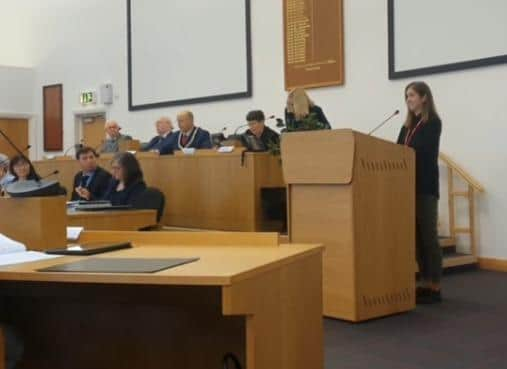Climate campaigner urges Derbyshire council to withdraw dairy and meat products and introduce plant-based foods instead
and live on Freeview channel 276
Plants-Based Climate Campaign supporter Sarah Foy, of South Normanton, gave a speech to Bolsover District Council’s full council meeting on Wednesday, October 11, calling for the council to follow other local authorities by introducing solely plant-based food and drinks at events during – what she referred to – as a climate and ecological emergency.
Ms Foy said Bolsover prides itself on being one of the more forward-thinking districts in the UK and the council has put climate considerations at the heart of its governance with a Carbon Reduction Plan to reduce carbon emissions by 50 per cent by 2030 and 80 per cent by 2050 but she stressed the plan does not include the council’s provision of food.
Advertisement
Hide AdAdvertisement
Hide AdShe told the meeting at the council offices, at The Arc, in Clowne: “The science is clear that meat and dairy are major contributors to the climate and ecological emergencies.


“Other councils, for example Oxfordshire County Council, Oxford City, Cambridge City, Exeter City and the London Borough of Lewisham are ensuring that all food and drink provided at events is plant-based, and I’d like Bolsover District Council to do the same.
“This is the logical and necessary next step to help reduce greenhouse gas emissions of carbon as well as methane and nitrogen.
“It will help normalise plant-based eating, which according to an Oxford University study, is the single most effective thing an individual can do to reduce their environmental impact.”
Advertisement
Hide AdAdvertisement
Hide AdMs Foy argued that there are substantial evidence-based recommendations calling for a move away from meat and dairy and the review of the National Food Strategy, led by Henry Dimbleby in 2021, recommended a reduction in meat and dairy of 30 per cent within ten years and that food provided in the public sector should be plant-based.


She added that public organisations need to lead the way and she claims a new Oxford University study published, in July 2023, shows that the environmental impact of a meat-diet is far higher than one which is plant-based.
Charity worker Ms Foy said: “Meat and dairy products are almost always the most expensive part of a meal – whole food plant-based meals are considerably cheaper.
“By doing the right thing for the planet, and promoting eating for good health, the council can also save money by serving more plant-based foods. We can and must move away from meat and dairy, towards climate-friendly eating, and I believe councils can lead the way with this.”
Advertisement
Hide AdAdvertisement
Hide AdBolsover District Council was urged by Ms Foy to implement solely serving plant milk for tea and coffee offered at meetings, and for food and drink served at events to be exclusively plant-based.


The Government stated in April, that some residual, unavoidable, carbon emissions are to be expected with farming because of the raising of animals or the use of fertiliser.
However, it also stated there is a need to continue those activities while at the same time reducing emissions as far as possible and this must be done in a way that supports thriving farm businesses and maintains food production.
Measures used in farming to reduce carbon emissions include tree planting, peatland restoration and agroforestry, and by introducing cover crops which cover the soil and manage soil erosion, and since 1990 agricultural emissions have reduced by 12 per cent, according to the Government.
Advertisement
Hide AdAdvertisement
Hide AdIt added that the dairy sector reduced greenhouse gas emissions by 12per cent between 2000 and 2020 while still increasing milk production by 11 per cent with 21 per cent fewer cows and the Government wishes to continue supporting farmers.
Bolsover District Cllr Anne Clarke – environment portfolio holder – told the meeting that the district council considers that customers and guests at the local authority are currently provided with a choice of foods including dairy alternatives catering for vegans, vegetarians, and those with dietary intolerances.
Cllr Clarke added that the food and drink that the council offers will be monitored to better understand the different demands.
Ms Foy thanked the council for considering her request and stressed that she would be available to discuss the matter further with the local authority.
Advertisement
Hide AdAdvertisement
Hide AdFollowing the meeting, a Plants-Based Climate Campaign spokesperson said: “With the freak weather continuing this year into October, it is only a matter of time before the issue of real emissions reductions will start to be taken seriously by local and national governments alike.”